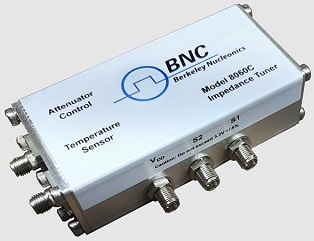Berkeley Nucleonics' Model 8060 Impedance Tuner/Generator |
||

Press Release Archives: 2024 | 2023 | 2022 | 2021 |2020 2019 | 2018 | 2017 | 2016 | 2015 2014 | 2013 | 2012 | 2011 | 2010 2009 | 2008 | 2007 | 2006 | 2005 Content is copyright of company represented. Page format, custom text and images are RF Cafe copyright - do not distribute.
Berkeley Nucleonics' Model 8060 Impedance Tuner/Generator San Rafael, CA – August 2022 – This new state of the art Model 8060 Impedance Tuner / Generator from Berkeley Nucleonics puts reliable, repeatable noise parameter measurements in your lab at about $10k, an order of magnitude below what a mechanical table top system might cost. The compact digital device offers a standard frequency range from 0.1 MHz to 6.0 GHz and can be customized to tuned up or down for application-specific needs. A cryogenic option (Model 8060C) provides greater performance capability allowing cold noise parameter measurements. The small size and fully electronic design permit noise-parameter measurements of packaged and on-wafer devices, ensuring flexibility and short test times. The Model 8060C is designed to work down to absolute zero temperature (Zero Kelvin) use primarily in Radio Astronomy and Space Exploration, cryogenic Nuclear Magnetic Resonance (NMR), and Quantum Computers. A host of MATLAB and other scripts are provided to allow users to take advantage of their own VNA, Spectrum Analyzer, and Noise Source.
A Digital Impedance Generator Our proprietary wideband impedance tuner method allows for quick and precise measurements of noise parameters for a large number of frequencies with astounding repeatability. On-board memory stores calibration data and documentation. A temperature sensor is included for monitoring the internal temperature which improves measurement accuracy. The Model 8060 frequency range is optimized for most commercial applications, such as WiFi, WiMax, LTE, 3G, 4G, and 5G, Bluetooth wireless standards. Receiver Design To design a receiver, engineers will need to select transistors for the design. You could obtain a sample of the transistor and perform noise parameter measurements while possibly setting the transistor to different power consumption settings and also varying the temperature. This gives the engineer complete information on how to select "matching" components (inductors and capacitors) that go at the input of the transistor to obtain the lowest noise figure and ultimately allows him to design the best performing receiver. Amplifier Design If an engineer has developed an amplifier, he may want to know its noise figure given that an antenna is not exactly 50 ohm. The engineer measures noise parameters and then uses them to calculate the amplifier noise figure for a particular antenna. An engineer has an amplifier and wants to know whether its noise figure can be improved. The measurement of noise parameters would reveal how far away the amplifier noise figure is from the minimum possible noise figure. Noise parameters can then be used to determine what needs to be done (i.e. what "matching" network is needed) to improve the noise figure. Component Manufacturing Component manufacturers wants to bin parts (these could be transistors that are not designed for 50 ohm ) based on their performance. A quick measurement of the minimum noise figure at just one frequency could allow binning parts by performance.
About Berkeley Nucleonics Corporation Founded in 1963, BNC is a leading manufacturer of precision electronic instrumentation for RF/Microwave research. BNC has its corporate headquarters in San Rafael, California with several additional manufacturing facilities and sales offices located throughout the United States. Phased Array Antennas are evolving rapidly, and BNC is at the forefront of this technology shift, capitalizing on these new requirements with its patented, high performance, software-defined radio technology, and a PC-controlled, networked architecture that provides unparalleled performance for the price. In addition to the RF / Microwave signal source line of equipment, BNC offers Phase Noise Test Systems (Signal Source Analyzers) & Real-Time Spectrum Analyzers in 1963, BNC is a leading manufacturer of precision electronic instrumentation for RF/Microwave research. BNC has its corporate headquarters in San Rafael, California with several additional manufacturing facilities and sales offices located throughout the United States. Phased Array Antennas are evolving rapidly, and BNC is at the forefront of this technology shift, capitalizing on these new requirements with its patented, high performance, software-defined radio technology, and a PC-controlled, networked architecture that provides unparalleled performance for the price. In addition to the RF / Microwave signal source line of equipment, BNC offers Phase Noise Test Systems (Signal Source Analyzers) & Real-Time Spectrum Analyzers.
Contact Bernadette Jamieson Email: info@berkeleynucleonics.com
Posted September 7, 2022 |
||

